新概念英语第二册Lesson16_18课文翻译及词汇
新概念英语第2册Lesson16~18语法知识点
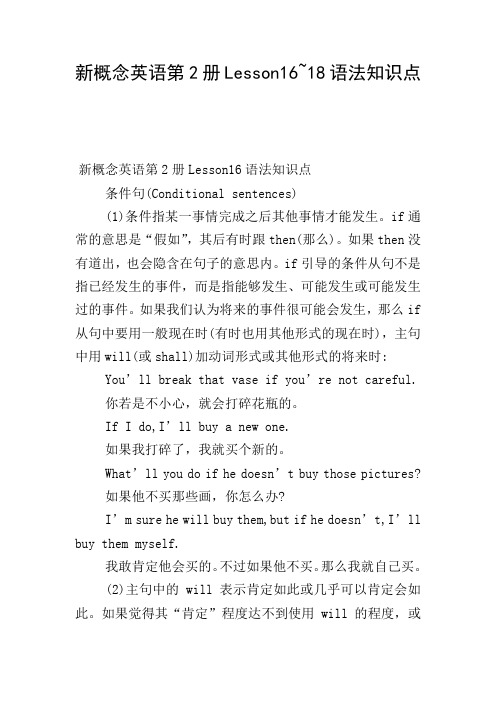
新概念英语第2册Lesson16~18语法知识点新概念英语第2册Lesson16语法知识点条件句(Conditional sentences)(1)条件指某一事情完成之后其他事情才能发生。
if通常的意思是“假如”,其后有时跟then(那么)。
如果then没有道出,也会隐含在句子的意思内。
if引导的条件从句不是指已经发生的事件,而是指能够发生、可能发生或可能发生过的事件。
如果我们认为将来的事件很可能会发生,那么if 从句中要用一般现在时(有时也用其他形式的现在时),主句中用will(或shall)加动词形式或其他形式的将来时: You’ll break that vase if you’re not careful.你若是不小心,就会打碎花瓶的。
If I do,I’ll buy a new one.如果我打碎了,我就买个新的。
What’ll you do if he doesn’t buy those pictures?如果他不买那些画,你怎么办?I’m sure he will buy them,but if he doesn’t,I’ll buy them myself.我敢肯定他会买的。
不过如果他不买。
那么我就自己买。
(2)主句中的will表示肯定如此或几乎可以肯定会如此。
如果觉得其“肯定”程度达不到使用will的程度,或者如果想表达建议等其他意思,就可以用别的情态助动词来代替will:Shall post these letters for you?我替你将这些信发了好吗?You can post them if you want to.如果你愿意,你可以把它们寄走。
If it’s fine tomorrow,we can/may go out.如果明天天气好,我们可以/可能出门去。
(3)主句还可以用祈使语气等表示请求、建议等:Stay at home tomorrow if it rains.明天如果下雨就呆在家里。
新概念英语第二册 Lesson16

☆ obey v. 服从, 顺从,执行 Soldiers are trained to obey without questions. 训练士兵要绝对服从命令。 obey without questions 绝对服从命令 obey rules 遵守规章制度 obey orders 服从命令 obey the law 遵守法律 反义:disobey
☆park v.停放(汽车) parking area 停车场 no parking :禁止停车 1) n. 公园 (public garden) the Central Park (纽约的)中央公园 2) v. 停车 eg. You can‟t park in this street. parking lot 停车场 car park 停车场 eg. No parking! 禁止停车! eg. No smoking! 禁止抽烟! eg. No spitting! 禁止吐痰!
☆reminder n.提示(可以致人、也可指物) eg. The waiters were cleaning the tables, which served as a reminder that it was time to leave. remind v. 提示, 提醒 1) v. 提示 remind sb of sth 提醒某人注意某事或做某事 You remind me of your mother. remind sb. to do sth. Remind me to answer that letter. 提醒我回那封信。 Do I have to remind you again? 我还需要再提醒你吗? 2) 令人回想起某事 remind sb of sb/sth 使人回想起了某人/某事 eg. This song reminds me of my old lover. 这首歌使 我想起了我的旧情人。
新概念英语第二册Lesson16~18课文翻译及词汇(最新)

新概念英语第二册Lesson16~18课文翻译及词汇(最新)新概念英语第二册Lesson16课文翻译及词汇【课文】First listen and then answer the question.听录音,然后回答以下问题。
What was the polite request?If you park your car in the wrong place, a traffic policeman will soon find it. You will be very lucky if he lets you go without a ticket. However, this does not always happen. Traffic police are sometimes very polite. During a holiday in Sweden, I found this note on my car: 'sir, we welcome you to our city. This is a "No Parking" area. You will enjoy your stay here if you pay attention to our street signs. This note is only a reminder.' If you receive a request like this, you cannot fail to obey it!【课文翻译】一旦你把汽车停错了地方,交通警很快就会发现。
如果他没给你罚单就放你走了,算你走运。
然而,情况并不都是这样,交通警有时也很客气。
有一次在瑞典度假,我发现我的车上有这样一个字条:“先生,欢迎您光临我们的城市。
此处是‘禁止停车’区。
如果您对我们街上的标牌稍加注意,您在此会过得很愉快的。
谨此提请注意。
新概念英语第二册课文翻译:Lesson 18 He often does this
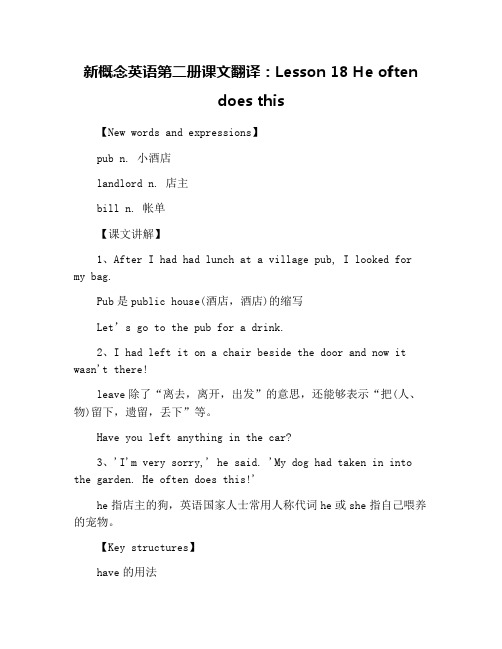
新概念英语第二册课文翻译:Lesson 18 He oftendoes this【New words and expressions】pub n. 小酒店landlord n. 店主bill n. 帐单【课文讲解】1、After I had had lunch at a village pub, I looked for my bag.Pub是public house(酒店,酒店)的缩写Let’s go to the pub for a drink.2、I had left it on a chair beside the door and now it wasn't there!leave除了“离去,离开,出发”的意思,还能够表示“把(人、物)留下,遗留,丢下”等。
Have you left anything in the car?3、'I'm very sorry,' he said. 'My dog had taken in into the garden. He often does this!'he指店主的狗,英语国家人士常用人称代词he或she指自己喂养的宠物。
【Key structures】have的用法1、have作为助动词构成各种完成时和完成实行时2、have还能够作完全动词,当作“具有、拥有”讲时,它和have got通常能够互换。
have做“有, 患病” 概念时, 可作为实义动词, 也可作为非实义动词。
在英国英语中的疑问句和否定句中have(具有)的用法与be相同,即能够不用助动词do或did;在美国英语中,常用do助动词和have一起构成疑问句和否定句。
I don’t h ave a pen/a headache.I haven’t a pen /a headache.三种情况have 能够用 have got取代I have a pen. I have got a pen. “有”I have a headache. I have got a headache. “得病”have to== have got tohave作“具有,拥有”讲时是状态动词,不能用于实行时态或被动语态,通常用于一般现在时。
新概念英语第二册课文(中英文对照)
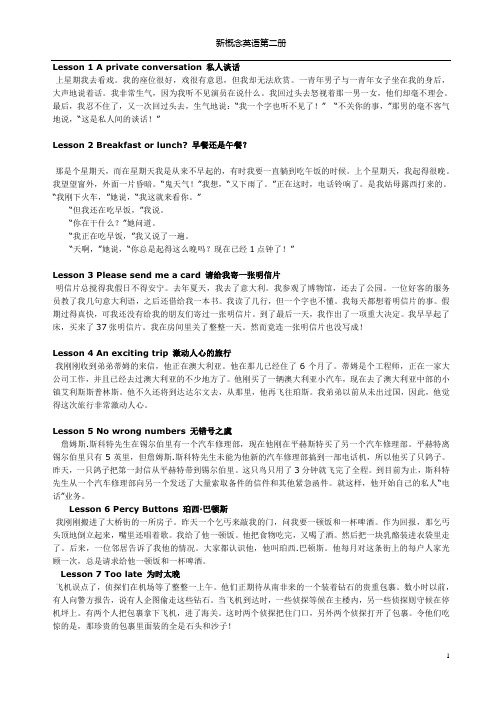
Lesson 1 A private conversation 私人谈话上星期我去看戏。
我的座位很好,戏很有意思,但我却无法欣赏。
一青年男子与一青年女子坐在我的身后,大声地说着话。
我非常生气,因为我听不见演员在说什么。
我回过头去怒视着那一男一女,他们却毫不理会。
最后,我忍不住了,又一次回过头去,生气地说:“我一个字也听不见了!” “不关你的事,”那男的毫不客气地说,“这是私人间的谈话!”Lesson 2 Breakfast or lunch? 早餐还是午餐?那是个星期天,而在星期天我是从来不早起的,有时我要一直躺到吃午饭的时候。
上个星期天,我起得很晚。
我望望窗外,外面一片昏暗。
“鬼天气!”我想,“又下雨了。
”正在这时,电话铃响了。
是我姑母露西打来的。
“我刚下火车,”她说,“我这就来看你。
”“但我还在吃早饭,”我说。
“你在干什么?”她问道。
“我正在吃早饭,”我又说了一遍。
“天啊,”她说,“你总是起得这么晚吗?现在已经1点钟了!”Lesson 3 Please send me a card 请给我寄一张明信片明信片总搅得我假日不得安宁。
去年夏天,我去了意大利。
我参观了博物馆,还去了公园。
一位好客的服务员教了我几句意大利语,之后还借给我一本书。
我读了几行,但一个字也不懂。
我每天都想着明信片的事。
假期过得真快,可我还没有给我的朋友们寄过一张明信片。
到了最后一天,我作出了一项重大决定。
我早早起了床,买来了37张明信片。
我在房间里关了整整一天。
然而竟连一张明信片也没写成!Lesson 4 An exciting trip 激动人心的旅行我刚刚收到弟弟蒂姆的来信,他正在澳大利亚。
他在那儿已经住了6个月了。
蒂姆是个工程师,正在一家大公司工作,并且已经去过澳大利亚的不少地方了。
他刚买了一辆澳大利亚小汽车,现在去了澳大利亚中部的小镇艾利斯斯普林斯。
他不久还将到达达尔文去,从那里,他再飞往珀斯。
我弟弟以前从未出过国,因此,他觉得这次旅行非常激动人心。
逐句精讲新概念英语第二册:第18课他经常干这种事!

Lesson18 He often does this 课⽂内容: After I had had lunch at a village inn, I looked for my bag. I had left it on a chair beside the door and now it wasn't there ! As I was looking for it, the inn-keeper came in. ‘Did you have a good meal ' he asked. ‘Yes, thank you,' I answered, ‘but I can't pay the bill. I haven't got my bag.' The inn-keeper smiled and immediately went out. In a few minutes he returned with my bag and gave it back to me. ‘I'm very sorry,' he said ' My dog had taken it into the garden. He often does this.' 本⽂语法:have的时态和变化 语法归纳:have作实义动词意为“拥有”,作助动词帮助构成完成时态。
1)作实义动词,意为“拥有”(=own, possess,have got): I have over a thousand books. = I own / possess over a thousand books 我有1000 多本书。
Did you have plenty of time to see your mother?你有⾜够的时间去看望你母亲吗? Have you got any views about this new plan?对于这个新计划你有何看法?(在英式⼝语中常⽤ have got代替have。
新概念英语第二册:第18课课文详解及语法解析

新概念英语第二册:第18课课文详解及语法解析课文详注 Further notes on the text1.After I had had lunch at a village pub, I looked for my bag.我在一家乡村小酒店吃过午饭后,就找我的提包。
(1)have在have lunch这个词组中是完全动词而不是助动词,所以,像其他完全动词一样,它的过去完成时要加助动词had。
(cf. 本课语法)(2)pub为public house(酒店,酒吧)的缩略形式,在英国英语的口语中较常见:Let's go to the pub for a drink.咱们去酒店喝杯酒吧。
(3)look for强调“寻找”这个动作,而不涉及结果:I looked for my key everywhere, but I couldn't find it.我到处寻找我的钥匙,但还是没找到。
2.I had left it on a chair beside the doo r…我曾把它放在门边的椅子上……leave除了“离去”、“离开”、“出发”的意思,还能够表示“把(人、物)留下”、“遗留”、“丢下”等:The dog has left your bag by a tree.那狗把你的提包丢在了一棵树旁。
Have you left anything in the car?你有没有把什么东西丢在车里?Leave the books on the desk.把书放在课桌上。
3.My dog had taken it into the garden. He often doesthis!我的狗把它弄到花园里去了,他常干这种事!he在这里指代的是狗。
动物通常用it来代表,即被看成像东西一样。
但是,指宠物、家畜或民间故事中的动物时,我们经常也用he,she,who等,即使得它们“人格化”并具有性别。
新概念第二册Lesson 18

助动词
动词
村庄
酒馆
寻找
After I had had lunch at a village pub, I looked for my bag.
I had left it on a chair beside the door and now it wasn't there!
没有
haven't got my bag. ’
一些
The landlord smiled and immediately went otes he returned with my bag and gave it back to me.
‘I'm very sorry, ’he said. ‘My dog had taken it into the
Tim has got two sisters. =Tim has two sisters.
The house hasn’t got a garden.
The house doesn’t have a garden.
1. Sarah hasn’t got / doesn’t have a car. She goes everywhere by bicycle. 2. Charles isn’t happy. He has got / has a lot of problems. 3. ‘Where’s my pen?’’I don’t know. I haven’t got/don’t have it.’
a few 修饰可数名词复数,一些,有点 few 修饰可数名词复数,否定,几乎没有 a little 修饰不可数名词 little 修饰不可数名词,否定 a lot of=losts of 修饰不可数名词&可数名次复数,相当于many/much plenty of 修饰不可数名词&可数名词复数,足够的,大量的,比a lot of 多 1.There was little food in the fridge. It was nearly empty. 2.Can I have a little milk in my coffee,please?
新概念第二册Lesson 18知识要点总结

新概念第二册Lesson 18复习要点一.L18词汇讲解:1.pub 小酒店bar 酒吧book bar 书吧/tea bar 茶吧/ internet bar 网吧ndlord 店主land 土地lord 领主Lord of Ring 指环王3.bill 账单pay the bill 付账Bill,please./Check, please.结账。
二.重难点:1.have got/has got 有/得了某种疾病,当have 或者has 的意思是“有,得病”的使用,可以互换2.give up 放弃,投降give in 投降/上交give away 送人区分give in 和give up 的不同:The soldiers lost the battle but they didn’t give themselves up . 士兵们输掉了战斗,但是他们没有投降。
The soldiers didn’t give in.士兵们没有投降。
3.a village pun 村庄的小酒馆an apple tree 一棵苹果树a woman doctor 一位女医生注意:two apple trees /two women doctors4.look for 强调动作或者过程find强调结果类比:look at/see listen to/hear put on/wear。
5.leave sb. sth/leave sth. for sb.给某人留下某物6.return的含义返回:He’ll return to his country in 2 years.他两年之后会回来。
返还,偿还:I’ll return your money soon.我会很快还你的钱。
7.几个“除......之外”的词和短语:besides/except/apart from/except fromapart from和except for 可用于句首。
新概念英语第二册课文Lesson16讲解
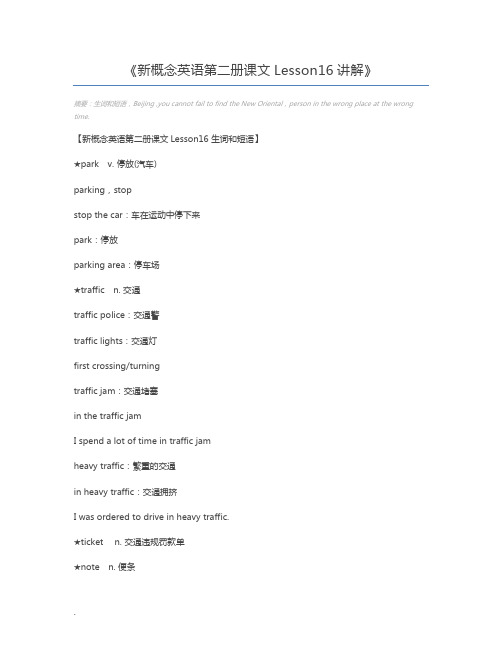
《新概念英语第二册课文Lesson16讲解》摘要:生词和短语,Beijing ,you cannot fail to find the New Oriental,person in the wrong place at the wrong time.【新概念英语第二册课文Lesson16 生词和短语】★park v. 停放(汽车)parking,stopstop the car:车在运动中停下来park:停放parking area:停车场★traffic n. 交通traffic police:交通警traffic lights:交通灯first crossing/turningtraffic jam:交通堵塞in the traffic jamI spend a lot of time in traffic jamheavy traffic:繁重的交通in heavy traffic:交通拥挤I was ordered to drive in heavy traffic.★ticket n. 交通违规罚款单★note n. 便条message:消息note:纸条,纸钞make notes:做笔记★area n. 地段area:场地,地段(一块对方)place:地点region:地区(交战,开火)In this region,there were a lot of wars.★sign n. 指示牌★reminder n. 提示remind v.:提示,提醒remind sb of sthremind sb to do sthAn older photo can remind me of my childhood. You remind me of your mother.reminder:可以指人,可以指物★fail v. 无视,忘记fail v.失败fail+宾语:失败做某事fail in doing sth:在某些方面失败He failed./He failed in examination.fail to do:没有能够在某事He failed to swim acrooss the river.not fail to do sth.一定能够某事I can not fail to pass it.You can not fail to drive it.你一定能够驾驶If you receive a request like this,You can not fail to obey it.If you arrived in Beijing ,you cannot fail to find the New OrientalSchool.★obey v. 服从If you park your car in the wrong place, a traffic policeman will soon find it. You will be very lucky if he lets you go without a ticket. However, this does not always happen. Traffic police are sometimes very polite. During a holiday in Sweden, I found this note on my car: sir, we welcome you to our city. ?(暂不提供全部内容)【新概念英语第二册课文详解Lesson16】fail,fail to do sth,not fail to do sth:一定能够做park:停放in the wrong placewrong:不合适的,right:合适的He is the right person who you are looking for.They met(A met B)in the wrong place at the wrong time.You met the wrong person in the wrong place at the wrong time.真实条件句:假设很有可能发生.If it snows只要是状语从句,一律用一般现在取代一般将来如果在条件从句中,从句往往是一般现在时,主句仍然为一般将来时真实条件句中,从句往往为现在时,主句中会用一般将来时或祈使句If he is sleeping,dont wake him up.If 引导的叫条件句,without后面的名词也叫条件句without+n.:如果没有Without water,fish cannot live.however=but,然而however常常放在句首或句子中都可以,but习惯放在两个句子之间but转折性语义比较强,however转折语义比较弱traffic police:交通警sometimes:有几次,有时,偶尔on my carsir,直接称呼的时候不和姓相连1.表示尊称2.考研不知道对方姓什么,只要知道对方是男性就可以welcome sb to+地点:欢迎某人来某地pay attention to:注意(思想上)if.真实条件You will enjoy your stay here,enjoy:享受,stay(n.)I have enjoyed my stay here.Enjoy your stay here.only a reminder==not a ticketreceive a quest like this,cannot fail to obey it总结主句会有祈使句,一般将来时,情态动词without+名词:如果没有,起了条件的作用withou your help/rainhowever=but,往往一出现,前后都有标点符号隔开,后面会加逗号,but不会对一个不认识的男士,sir; mister的后面一定要加姓,sir的后面不能加姓sir/madamenjoy your stay hereI have enjoyed my stay here.You cannot fail to obey it:你一定会遵守。
新概念英语第二册Lesson16_18逐句精讲
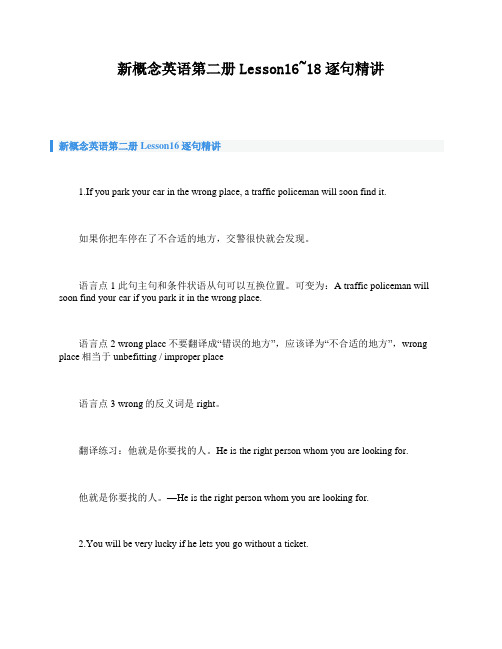
新概念英语第二册Lesson16~18逐句精讲新概念英语第二册Lesson16逐句精讲1.If you park your car in the wrong place, a traffic policeman will soon find it.如果你把车停在了不合适的地方,交警很快就会发现。
语言点1 此句主句和条件状语从句可以互换位置。
可变为:A traffic policeman will soon find your car if you park it in the wrong place.语言点2 wrong placc不要翻译成“错误的地方”,应该译为“不合适的地方”,wrong place相当于 unbefitting / improper place语言点3 wrong的反义词是right。
翻译练习:他就是你要找的人。
He is the right person whom you are looking for.他就是你要找的人。
—He is the right person whom you are looking for.2.You will be very lucky if he lets you go without a ticket.假如他不罚你的款就让你走了,算你走运。
语言点1 此句包含if引导的真实条件句,位置位于主句之后。
.语言点2 very lucky = quite fortunate / providential 非常幸运的语言点3 let sb. go让某人走:Let’s go !让我们走(此处’s非名词所有格,而是let us的综写。
)语言点4 without没有,实际上表示条件:Fish will die without water.鱼离开了水就会死。
/1 will die without you.没有你我活不了。
/ Life will be meaningless without love.生活缺少爱将是无意义的。
裕兴版新概念英语第二册详细笔记_第十六课
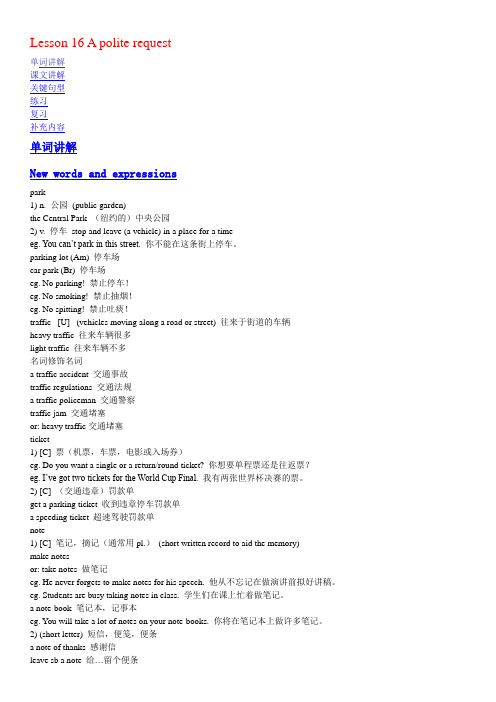
Lesson 16 A polite request单词讲解课文讲解关键句型练习复习补充内容单词讲解New words and expressionspark1) n. 公园(public garden)the Central Park (纽约的)中央公园2) v. 停车stop and leave (a vehicle) in a place for a timeeg. You can‟t park in this street. 你不能在这条街上停车。
parking lot (Am) 停车场car park (Br) 停车场eg. No parking! 禁止停车!eg. No smoking! 禁止抽烟!eg. No spitting! 禁止吐痰!traffic [U] (vehicles moving along a road or street) 往来于街道的车辆heavy traffic 往来车辆很多light traffic 往来车辆不多名词修饰名词a traffic accident 交通事故traffic regulations 交通法规a traffic policeman 交通警察traffic jam 交通堵塞or: heavy traffic交通堵塞ticket1) [C] 票(机票,车票,电影或入场券)eg. Do you want a single or a return/round ticket? 你想要单程票还是往返票?eg. I‟ve got two tickets for the World Cup Final. 我有两张世界杯决赛的票。
2) [C] (交通违章)罚款单get a parking ticket 收到违章停车罚款单a speeding ticket 超速驾驶罚款单note1) [C] 笔记,摘记(通常用pl.)(short written record to aid the memory)make notesor: take notes 做笔记eg. He never forgets to make notes for his speech. 他从不忘记在做演讲前拟好讲稿。
新概念第二册-Lesson 18 He often does this!
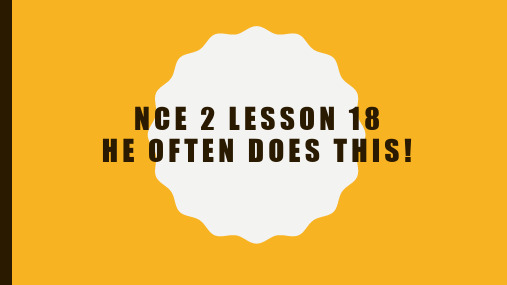
it into the garden. He often does this.’
种事。句中的He是指店主的狗。
英语国家人士常用人称代词he
或she来指自己喂养的宠物。
参考译文
我在一家乡村小酒店吃过午饭后,就找我的提包。我曾把它放在门边的椅 子上,可这会而不见利!当我正在寻找时,酒店老板走了进来。 “您吃得好吗?”他问。 “很好,谢谢。”我回答,“我付不了账,我的提包没有了。” 酒店老板笑了笑,马上走了出去。一会而工夫他拿着我的提包回来了,把 它还给了我。 “实在抱歉,”他说,“我的狗把它弄到花园里去了,他常干这种事!”
BILL
bill /bɪl/ n. 账单 pay the bill 付账
WHAT HAD HAPPENED TO THE WRITER’S BAG?
TEXT
After I had had lunch at a village inn, I looked for
my bag. I had left it on a chair beside the door and
the bill. I haven’t got my bag.’ The inn-keeper
smiled and immediately went out. In a few
minutes he returned with my bag and gavit it back
to me. ‘I’m very sorry,’ he said ‘My dog had taken He often does this. 他经常干这
now it was’t there! As I was looking for it, the inn-
keeper came in. ‘Did you have a good meal?’ he
新概念英语2_第18课
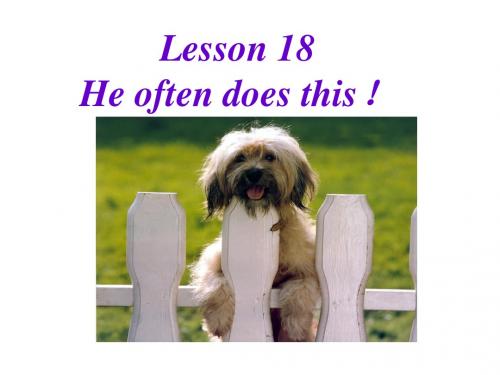
3.have可译为“拥有”=have got.但have got常用于一般现 在时,其他时态中用have. 在英式英语中,have用法与be相同,即可以不用助动词 do/does/did进行否定和疑问。 Eg: He has a pen.—He hasn’t a pen.—Has he a pen?— Yes ,he has.—No, he hasn’t.
The landlord smiled and immediately went out. In a few minutes he returned with my bag and gave it back to me. ‘I'm very sorry,’ he said. ‘My dog had taken it into the garden. He often does this!’ 1. immediately 立刻,马上 同义词:at once, instantly, right away, straight away 2. in a few minutes 几分钟后 类似的说法: in a few days in a few weeks in a few months in a few years
I had left it on a chair beside the door and now it wasn’t there! 1.leave ---left---left a.离开,出发 leave sp离开某地 leave for sp出发去某地 Eg:他要离开重庆。 He will leave Chongqing. 他要出发去重庆。 He will leave for Chongqing. b.把(人、物)留下、丢下、遗留等。 Eg: Have you left anything in the car? 2. beside: prep.在…旁边 Eg:他的汽车正停在那辆卡车的旁边。 His car is parking beside the truck.
新概念英语第2册Lesson16~18语法知识点
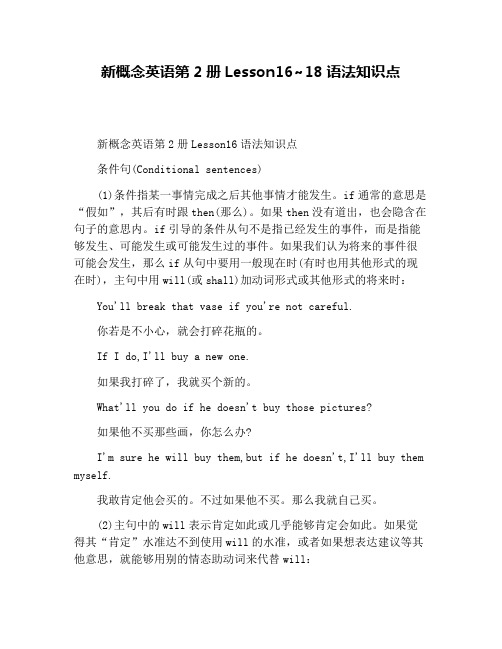
新概念英语第2册Lesson16~18语法知识点新概念英语第2册Lesson16语法知识点条件句(Conditional sentences)(1)条件指某一事情完成之后其他事情才能发生。
if通常的意思是“假如”,其后有时跟then(那么)。
如果then没有道出,也会隐含在句子的意思内。
if引导的条件从句不是指已经发生的事件,而是指能够发生、可能发生或可能发生过的事件。
如果我们认为将来的事件很可能会发生,那么if从句中要用一般现在时(有时也用其他形式的现在时),主句中用will(或shall)加动词形式或其他形式的将来时:You'll break that vase if you're not careful.你若是不小心,就会打碎花瓶的。
If I do,I'll buy a new one.如果我打碎了,我就买个新的。
What'll you do if he doesn't buy those pictures?如果他不买那些画,你怎么办?I'm sure he will buy them,but if he doesn't,I'll buy them myself.我敢肯定他会买的。
不过如果他不买。
那么我就自己买。
(2)主句中的will表示肯定如此或几乎能够肯定会如此。
如果觉得其“肯定”水准达不到使用will的水准,或者如果想表达建议等其他意思,就能够用别的情态助动词来代替will:Shall post these letters for you?我替你将这些信发了好吗?You can post them if you want to.如果你愿意,你能够把它们寄走。
If it’s fine tomorrow,we can/may go out.如果明天天气好,我们能够/可能出门去。
(3)主句还能够用祈使语气等表示请求、建议等:Stay at home tomorrow if it rains.明天如果下雨就呆在家里。
新概念英语第二册lesson-18
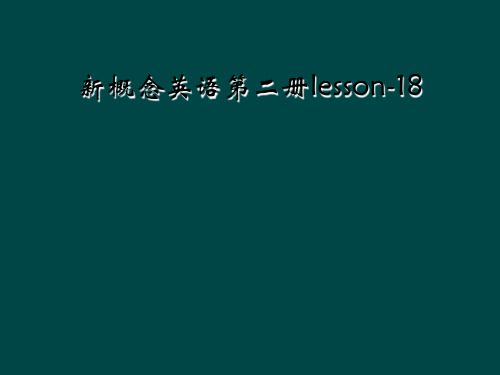
look for 寻找〔过程〕 I am looking for my bag.
find 找到〔结果,不能用进展时态〕 I found my ring under the sofa.
find out 查明,弄清〔情况〕,搜出〔结果〕 You should find out (the answer) for yourself.
w展h时ile态所时引,导从的句从的句主中语主有语时与被主省句略主。语一样,且从句为进 He watched TV while (he was) eating. 他在吃饭时看了电视。
when 1) 当…时候 Come to me when you like. 当你愿意时到我这儿来。 I first met him the day when I arrived here. 我到这儿的那天第一次碰见他。
bring sb sth fetch “去拿〔某物〕来〞的动作〔去取来〕, 双向 I’ll fetch a glass. 我去取个杯子。
练习:用适当的词填空:
1. Will the person who took my ruler please give it back to me?
2. When my children grew up, I gave all their toys away.
我能把鞋放在这儿吗? 你是把所有的东西都落在车里了吗?
别把门开着。 话还是不讲出来的好。 让它们保持原样。
离开英国去环球旅游。
as 当…时候 1) 随着〔表示事态及状况的变化和进展〕 As she grew older, she became more pessimistic [pesi'mistik]. 随着年龄的增长,她变得愈加悲观。
- 1、下载文档前请自行甄别文档内容的完整性,平台不提供额外的编辑、内容补充、找答案等附加服务。
- 2、"仅部分预览"的文档,不可在线预览部分如存在完整性等问题,可反馈申请退款(可完整预览的文档不适用该条件!)。
- 3、如文档侵犯您的权益,请联系客服反馈,我们会尽快为您处理(人工客服工作时间:9:00-18:30)。
新概念英语第二册Lesson16~18课文翻译及词汇
新概念英语第二册Lesson16课文翻译及词汇
【课文】
First listen and then answer the question.
听录音,然后回答以下问题。
What was the polite request?
If you park your car in the wrong place, a traffic policeman will soon find it. You will be very lucky if he lets you go without a ticket. However, this does not always happen. Traffic police are sometimes very polite. During a holiday in Sweden, I found this note on my car: 'sir, we welcome you to our city. This is a "No Parking" area. You will enjoy your stay here if you pay attention to our street signs. This note is only a reminder.' If you receive a request like this, you cannot fail to obey it!
【课文翻译】
一旦你把汽车停错了地方,交通警很快就会发现。
如果他没给你罚单就放你走了,算你走运。
然而,情况并不都是这样,交通警有时也很客气。
有一次在瑞典度假,我发现我的车上有这样一个字条:“先生,欢迎您光临我们的城市。
此处是‘禁止停车’区。
如果
您对我们街上的标牌稍加注意,您在此会过得很愉快的。
谨此提请注意。
”如果你收到这样的恳求,你是不会不遵照执行的!
【生词和短语】
park v 停放(汽车)
traffic n. 交通
ticket n. 交通违规罚款单
note n. 便条
area n. 地段
sign n. 指示牌
reminder n. 提示
fail v. 无视,忘记
obey v. 服从
新概念英语第二册Lesson17课文翻译及词汇
【课文】
First listen and then answer the question.
听录音,然后回答以下问题。
Why doesn't Aunt Jennifer tell anyone how old she is?
My aunt Jennifer is an actress. She must be at least thirty-five years old. In spite of this, she often appears on the stage as a young girl. Jennifer will have to take part in a new play soon. This time, she will be a girl of seventeen. In the play, she must appear in a bright red dress and long black stockings. Last year in another play, she had to wear short socks and a bright, orange-coloured dress. If anyone ever asks her how old she is, she always answers, 'Darling, it must be terrible to be grown up!'
【课文翻译】
我的姑姑詹妮弗是位演员,她至少也有35岁了。
尽管如此,她却常在舞台上扮演小姑娘。
詹妮弗很快又要参加一个新剧的演出。
这一次,她将扮演一个17岁的少女。
演出时她必须穿一条鲜红色的裙子和黑色的长筒袜。
去年在演另一个剧时,她不得不穿短袜和一件鲜艳的橘红色的衣服。
一旦有人问起她有多大年纪,她总是回答:“亲爱的,长成大人真可怕啊!”
【生词和短语】
appear v. 登场,扮演
stage n. 舞台
bright adj. 艳丽的
stocking n. (女用)长筒袜
sock n. 短袜
新概念英语第二册Lesson18课文翻译及词汇
【课文】
First listen and then answer the question.
听录音,然后回答以下问题。
What had happened to the writer's bag?
After I had had lunch at a village pub, I looked for my bag. I had left it on a chair beside the door and now it wasn't there! As I was looking for it, the landlord came in.
'Did you have a good meal?' he asked
'Yes, thank you,' I answered, 'but I can't pay the bill. I haven't got my bag.'
The landlord smiled and immediately went out. In a few minutes he returned with my bag and gave it back to me.
'I'm very sorry,' he said. 'My dog had taken it into the garden. He often does this!'
【课文翻译】
我在一家乡村小酒店吃过午饭后,就找我的提包。
我曾把它放在门边的椅子上,可这会儿不见了!当我正在寻找时,酒店老板走了过来。
“您吃的好吗?”他问。
“很好,谢谢。
”我回答,“但我付不了帐,我的提包没有了。
”
酒店老板笑了笑,马上走了出去。
一会儿工夫他拿着我的提包回来了,把它还给了我。
“实在抱歉,”他说,“我的狗把它弄到花园里去了,他经常干这种事!”
【生词和短语】
pub n. 小酒店landlord n. 店主bill n. 账单。
